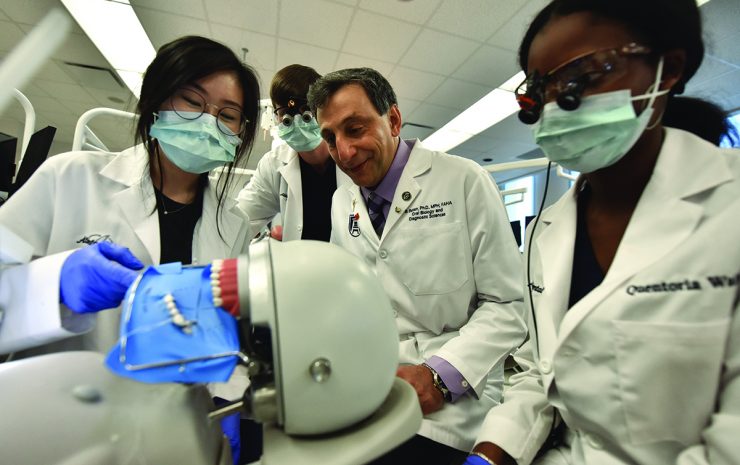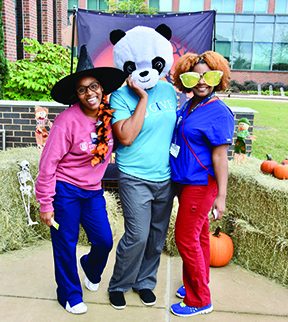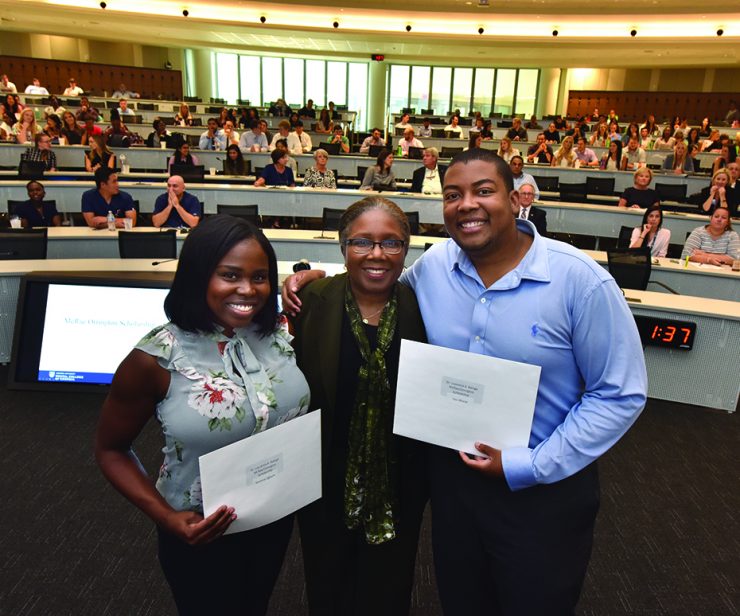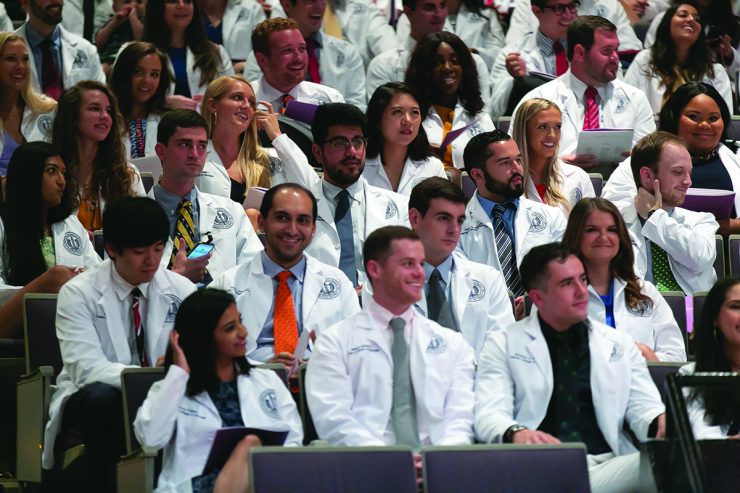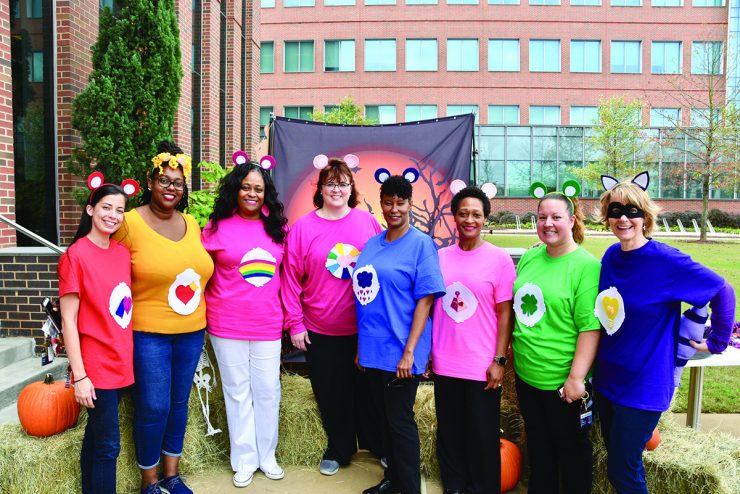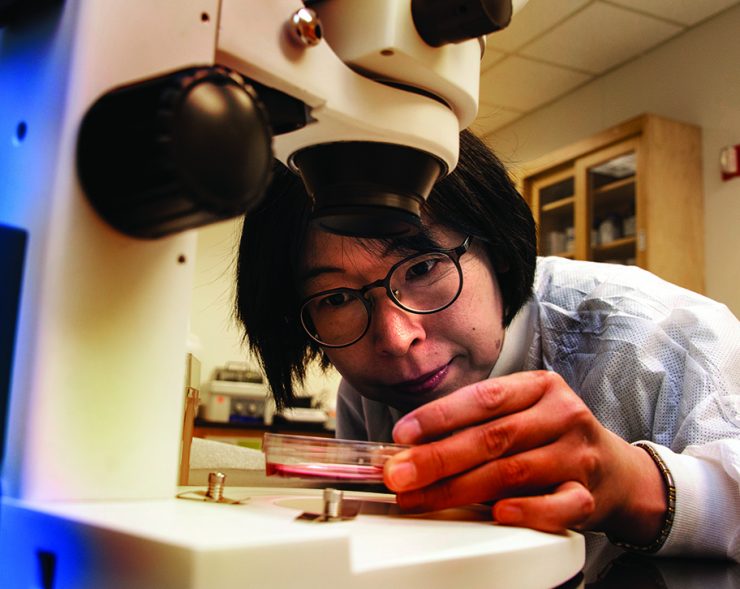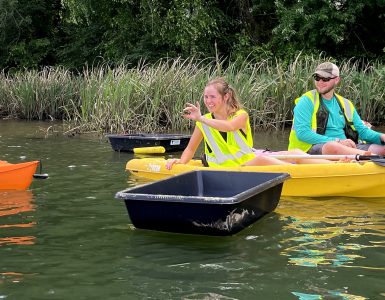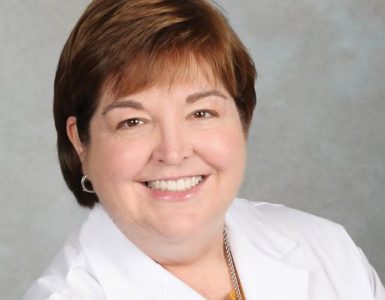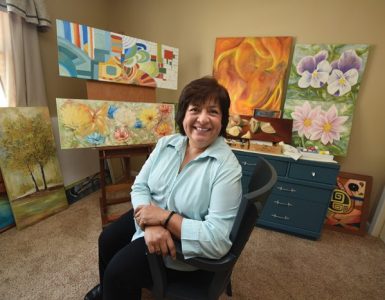When the first class of DCG students enrolled in 1969, two African-Americans were among their ranks.
That was no small distinction. At the time, fewer than 2 percent of U.S. dentists were African-American, so minorities who chose to pursue the career likely had precious few, if any, relatable role models.
Those two students, Matthew McRae Jr. and James L. Orrington, were determined to be those role models for future generations.
They have made good on that goal many times over. McRae, who oversees the McRae Family Dental Practice in Athens, Georgia, and Orrington, who practiced in Chicago for over 43 years, have mentored under-represented minorities throughout their careers, most importantly by enabling young people of color to look at their dentist and imagine themselves in those shoes. They also established the McRae/Orrington Scholarship in 1994 to ease the financial burden of deserving African American students.
Dean Carol A. Lefebvre is awed by their legacy and humbled that the college she represents set it in motion.
“Throughout our existence, the Dental College has been committed to diversity, equity and inclusion,” she said. “And we’ve made steady progress. In the 30 years I’ve been here, I have seen a tremendous increase in the diversity of our students, faculty and staff.”
But there is much room for growth, she stresses, and DCG has no intention of resting on its laurels.
“I grew up in Detroit in a very diverse community, and I witnessed the race riots of 1967,” she said. “I remember people taking to the streets to protest racism, and now, flashing forward, I’m seeing the same things again. That’s disturbing. In over 45 years, we haven’t made more progress than that?”
She is working diligently to ensure that the DCG community is part of the solution to the vexing problems that have recently sparked renewed nationwide protests against racism.
“What I’ve learned is that being silent is being part of the problem,” she said.
She supports the many students, faculty, staff and other members of the DCG community — and Augusta University at large — who have organized and participated in initiatives to combat racism and other forms of discrimination. Lefebvre and her team are committed to making things better in the DCG as well.
“Last year, we established a Diversity and Inclusion Steering Committee,” said Lefebvre, “and we have many initiatives in place to ensure we’re on the right track.”
The committee, chaired by DCG Diversity Officer Stephanie Perry and Vice Dean Kevin Frazier, is working on strategies to attract more under-represented minorities to the student body, faculty and staff; identify mentors for under-represented students; conduct training programs for faculty and staff; and conduct listening sessions on diversity-related issues, among other initiatives.
“We really try to engage the students in particular, making sure to listen to their thoughts, ideas and concerns,” said Lefebvre.
Common threads among the voices include the need to bolster the nationwide pipeline of dentists and other health-care professionals. “Minorities want to see others like them,” Lefebvre said. “This being the case, I’m particularly proud of our strong Student National Dental Association chapter (which aids in the advancement of minority students in the dental profession) and the fact that our very own students created the highly successful Impressions Program 20 years ago.”
Now emulated by dental colleges nationwide, the Impressions Program’s initial focus was to bring minority high school and undergraduate students to campus to familiarize them with dental school. Activities include campus tours, keynote addresses by esteemed people of color in the profession, extensive interaction with faculty members, mock admissions interviews and hands-on dental exercises. Attendance has increased from 30 to 200 participants over the years.
“The connections are key,” said Dr. Myra Morris (’20), who was heavily involved with the Impressions Program during her dental education. “Attendees actually get to meet our faculty while they’re here and go through mock admissions interviews. The faculty remember them when they come back for their actual interviews.”
The dean also cited other community-wide efforts to create a more inclusive campus, including DCG’s participation in the Equality Clinic, established in 2014 to provide physicals, head and neck exams, oral screenings, mental health support, blood work, screenings and other services to uninsured and under-insured members of the LGBTQ community and others who may feel disenfranchised from society.
The clinic, staffed by AU dental, medical and allied health sciences students and overseen by volunteer faculty, is open the second and fourth Wednesdays of each month in the AU Health Sciences Building. Volunteers also take their service off campus, including manning a booth at the annual Augusta Pride Festival. Said Dr. Emily Williams, who served as co-coordinator while completing a DCG periodontics residency, “I’m really drawn to public health dentistry, and there are very few clinics like this in the Southeast, outside of major urban areas like Atlanta. I just love helping people improve their overall quality of life.”
Approximately 30 DCG students man the clinic every semester, and many of them are repeat volunteers, said Dr. Kurt Metzler, assistant professor in Department of Restorative Services and an advisor in the clinic. “The Equality Clinic provides students in all disciplines of health care the experience of managing and supporting a particular, and historically ignored, segment of our population,” he said. “This clinic demands a social level of empathy and compassion from our students and facilitates an appreciation of the impact of dental health within a broader medical plan.”
Reaching out to diverse communities is a critical component of every DCG student’s education, Lefebvre said, referencing annual activities such as Give Kids a Smile Day and ongoing clinical rotations at public health clinics throughout the state.
“[The rotations are] a wonderful opportunity for students to provide oral health education and dental service to Georgia citizens who need dental care that is not readily available in rural, urban and underserved communities,”
said Ketarya D. Hunt Bass, DCG director of community outreach programs.
Dr. Laquanis Hooker, dental director of Medical Associates Plus in Augusta, is among the many dentists who mentor students through the program. Said Hooker, who serves as a DCG adjunct clinical faculty member, “I truly enjoy the opportunity to train the students and teach them different techniques. The 15 two-week rotations slots are virtually always filled. We’re pretty popular.”
Dr. Edward J. Green (’83), who practices general dentistry in Albany, Georgia with his daughter Erica, also a DCG alum, opens his office to students as well. Not only does he help them improve their clinical skills, but he counsels them on the importance of minority representation in organized dentistry. “I served as president of the Georgia Dental Association from 2004-05 and was the first African-American president,” he said. “I focused on service to the profession, increasing membership and increasing diversity. Students work hard to obtain their degrees, but that’s not the end of the road. In order to protect one’s profession, you’ve got to be engaged and be of service. Every voice matters.”
Lefebvre thinks the dental profession is uniquely positioned to take a leading role in a nationwide commitment to diversity. “As health care providers, we are committed to treating all patients with equity, dignity and respect,” she said. “We approach not only our profession, but life in general, through that lens.”
Lefebvre notes that she is proud to be following the lead of Augusta University as a whole.
Last spring, AU President Brooks Keel unveiled a multi-pronged approach to optimizing the representation of all under-represented groups on campus.
“It is time for us to act first by coming together with a shared commitment and determination to do the things we all know we need to do to make our university the place where all students, faculty and staff feel welcomed, included and are given equal opportunities to thrive,” he said.
Referencing a series of listening sessions devoted to the issue, Keel said, “After each meeting, I didn’t leave with a sense of gloom or negativity, but rather with a sense of optimism and hope for our future — optimism in that it is clear to all of us that we can do better, and hope for knowing that [each member of the AU community] would join me in the journey towards making our university better.”
He identified a short-term agenda, including conducting online diversity, equity and inclusion training for all students, faculty and staff, as well as strengthening the AU Office of Diversity and Inclusion, where regular status updates are provided at augusta.edu/diversity. The ODI is conducting continuous diversity-related Town Hall meetings for all. With more emphasis for students, the AU Office of Multicultural Student Engagement continues to centralize AU initiatives to create a diverse and inclusive environment. The office sponsors campuswide partnerships that help students learn how to celebrate unity in diversity through programs to encourage an inclusive campus climate (augusta.edu/multicultural).
Mid-term goals include forming a TRUST (Tolerance Reformation and Unity Support Team) to provide a healing campus response to incidents of bias; introducing markers and celebrations to honor AU heroes from diverse backgrounds; and unveiling a Create Diversity, Equity and Inclusion strategic plan.
In the long term, Keel resolved to implement actions recommended through the strategic planning process, such as distributing a diversity survey to gauge the university’s progress and refine it as needed.
“I believe that destiny has brought all of us together at this very moment in our history with these very challenges in front of us,” Keel said. “We will keep getting better as we travel this road and we will keep pressing onward and upward toward a place where diversity, equity and inclusion represent the very pillars of greatness for a place where everyone aspires to be called Augusta University.”
Lefebvre is eager to have a role in these campus-wide initiatives while guaranteeing an unparalleled commitment to optimize diversity and inclusion in the DCG.
“I want to ensure that every voice is heard,” she said. “Diversity makes us stronger.”

